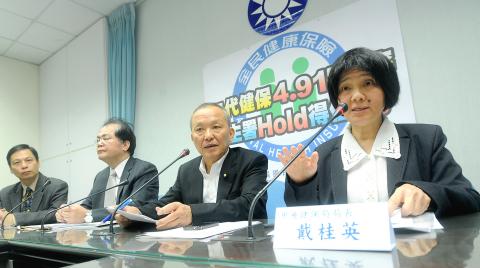Taiwanese have found it difficult to guard their wallets after President Ma Ying-jeou’s (馬英九) re-election, because almost everything has become more expensive, Democratic Progressive Party (DPP) lawmakers said yesterday.
“From gasoline to LPG [liquefied petroleum gas] to natural gas, and from fertilizer to tuition and health insurance ... you name it. The prices for all these things went up after Ma was re-elected,” DPP Legislator Pan Men-an (潘孟安) told a press conference.
It is ironic that the Cabinet, led by Premier Sean Chen (陳冲), calls itself a “Cabinet of relief,” which is supposed to strengthen the economy and enrich the people, he said.

Photo: Lin Cheng-kung, Taipei Times
Ma and former health minister Yaung Chih-liang (楊志良) had pledged that the fixed premium rate of 4.91 percent would be kept unchanged at least during the first five years of the second-generation National Health Insurance program, which is scheduled to come into effect in July, Pan said.
However, there are reports that the Department of Health is planning to adopt a higher rate, which would be a betrayal of Ma’s pledge, he said.
The DPP caucus urged the government to stay true to its promise by keeping the rate unchanged and revising regulations to make premium fees proportional to incomes, he said.
DPP Legislator Chen Ting-fei (陳亭妃) said the department had pledged that the health insurance premium would not increase for at least 80 percent of the total insured population under the new system.
Healthcare spending is not the only thing people are worried about, she said, adding that the Ministry of Education is mulling an increase in college tuition next month and the Ministry of Economic Affairs is considering raising gasoline and electricity prices.
The Executive Yuan’s citing of “market mechanisms” as the reason behind the hike is a “Taipei-centric perspective,” which ignores the well-being of families with lower incomes, retired economics professor Kenneth Lin (林向愷) told a separate press conference.
The government also ignored the role of Taiwan Power Co and CPC Corp, Taiwan, both of which are state-controlled companies, Lin said.
“It would be difficult to accept the price increase with the opaque operations of these two companies,” he said.
Lin ridiculed the government theory that mild inflation would benefit Taiwan’s economy, saying that if Ma does not tackle the price increases, public anger would drag his approval ratings to a new low.

Chinese Nationalist Party (KMT) Chairman Eric Chu (朱立倫), spokeswoman Yang Chih-yu (楊智伃) and Legislator Hsieh Lung-chieh (謝龍介) would be summoned by police for questioning for leading an illegal assembly on Thursday evening last week, Minister of the Interior Liu Shyh-fang (劉世芳) said today. The three KMT officials led an assembly outside the Taipei City Prosecutors’ Office, a restricted area where public assembly is not allowed, protesting the questioning of several KMT staff and searches of KMT headquarters and offices in a recall petition forgery case. Chu, Yang and Hsieh are all suspected of contravening the Assembly and Parade Act (集會遊行法) by holding

PRAISE: Japanese visitor Takashi Kubota said the Taiwanese temple architecture images showcased in the AI Art Gallery were the most impressive displays he saw Taiwan does not have an official pavilion at the World Expo in Osaka, Japan, because of its diplomatic predicament, but the government-backed Tech World pavilion is drawing interest with its unique recreations of works by Taiwanese artists. The pavilion features an artificial intelligence (AI)-based art gallery showcasing works of famous Taiwanese artists from the Japanese colonial period using innovative technologies. Among its main simulated displays are Eastern gouache paintings by Chen Chin (陳進), Lin Yu-shan (林玉山) and Kuo Hsueh-hu (郭雪湖), who were the three young Taiwanese painters selected for the East Asian Painting exhibition in 1927. Gouache is a water-based

Taiwan would welcome the return of Honduras as a diplomatic ally if its next president decides to make such a move, Minister of Foreign Affairs Lin Chia-lung (林佳龍) said yesterday. “Of course, we would welcome Honduras if they want to restore diplomatic ties with Taiwan after their elections,” Lin said at a meeting of the legislature’s Foreign Affairs and National Defense Committee, when asked to comment on statements made by two of the three Honduran presidential candidates during the presidential campaign in the Central American country. Taiwan is paying close attention to the region as a whole in the wake of a

OFF-TARGET: More than 30,000 participants were expected to take part in the Games next month, but only 6,550 foreign and 19,400 Taiwanese athletes have registered Taipei city councilors yesterday blasted the organizers of next month’s World Masters Games over sudden timetable and venue changes, which they said have caused thousands of participants to back out of the international sporting event, among other organizational issues. They also cited visa delays and political interference by China as reasons many foreign athletes are requesting refunds for the event, to be held from May 17 to 30. Jointly organized by the Taipei and New Taipei City governments, the games have been rocked by numerous controversies since preparations began in 2020. Taipei City Councilor Lin Yen-feng (林延鳳) said yesterday that new measures by